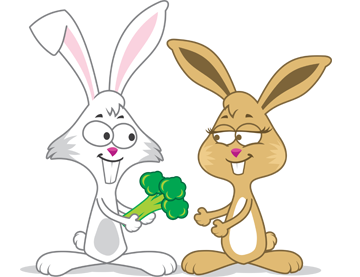Freedom from fear and distress
All rabbits deserve to be happy. Loving your rabbit and learning to understand their needs will help you identify the things you must do to prevent your rabbit feeling worried, upset, frightened and stressed. By doing these things, you will be providing your rabbit freedom from fear and distress.

Did you know that there is a special law protecting animals?
It says that your animal has five groups of welfare needs. These are five groups of things that animals need to be healthy and happy. These five welfare needs are called the Five Freedoms.
Under the Animal Welfare Act all animal guardians (owners) need to provide these five things for their animals. One of these Five Freedoms is: Freedom from Fear and Distress. In this section you will learn about this freedom and how you can make sure your rabbits are receiving the love, understanding and companionship they need to be free from fear and distress.





































